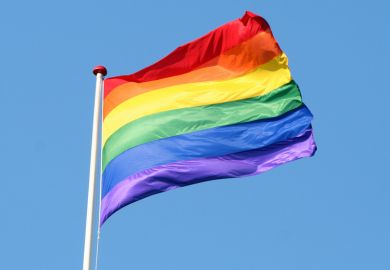Equality and dignity at work have been in the news a lot recently, from Hollywood to the BBC. The focus is often on discrimination arising from gender, religion or ethnic origin, but rarely from sexuality. Perhaps that’s because people think the fight for LGBT equality has been won. And I’m sure many assume that academia represents the epitome of tolerance. But, for me, this couldn’t be further from the truth.
In previous UK posts, I was respected, valued and included. But after taking up my current post at a Yorkshire university, things instantly changed. My first words to my line manager were: “It’s a pleasure to be here. I’m looking forward to working here.” Without looking up, he grunted: “Mmmm.” And that was that.
Shortly afterwards, at an awayday, he told the team that “there are gay people around”. Someone said they already knew about another gay member of staff. “No,” my line manager replied, and – again, without looking at me – nodded his head in my direction.
I’ve never been ashamed of my sexuality, and friends and family are aware of it. But in my first few months in the job, I’d never had cause to talk about my private life, and had never sought one – perhaps because I sensed I was working in a less tolerant environment than I was used to. I’d only previously indicated my sexuality on the HR form I filled in as part of the job application. It was supposedly confidential, but it must have been passed to my line manager.
During my first open day, as I was greeting prospective students, I overheard him talking to another member of staff nearby. He had evidently just mentioned that a gay person was on the team as the member of staff started joking in a derogatory manner about gay people. When he realised I was within earshot, my line manager became flustered; as for me, I felt alienated and demoralised.
Once sensitised to the environment, I picked up on other things I attributed to homophobia. On one occasion, I received an email from the deputy head of department that was abrupt, offensive, upsetting and clearly unacceptable in the workplace. I complained to my line manager but, behind a closed door, he yelled: “When I’m away, he’s in charge! He owns you!” I backed out of the office in shock.
One by one, the doors of career progression were slammed in my face. A more senior post was advertised that required someone with a strong research background. I applied, despite another “behind closed doors” meeting in which my line manager tried for some time to dissuade me, without giving a specific reason. At the time, I had a strong research output. By contrast, the research record of the successful candidate was a blank page. He didn’t even have a PhD.
I asked why I hadn’t been successful, but the feedback I got was minimal and did not address the job specification. When I asked for more detail, I received a one-word email from my line manager: “No.”
This was by no means the only time that less experienced and qualified – but straight – staff were given internal promotions or more interesting roles ahead of me, without due process or discussion. As a result, my motivation to move forwards dwindled and my health deteriorated. I had always been physically fit, competing in a lot of sporting events. But I gained two stone in weight, developed insomnia (sometimes only sleeping two hours a night) and experienced bouts of deep depression. I also developed chronic acid reflux, resulting in medication after medication.
I tried to keep my research going, but my line manager kept piling on the teaching hours, until my load became one of the heaviest in the university. Every time I challenged something, layers of management would back up my line manager, often in the same blunt language.
Finally, I reached breaking point. My doctor signed me off for stress and put me on medication, followed by counselling. My counsellor told me that usually it was possible to identify areas where clients are being irrational or overreacting, but my reactions were perfectly rational responses to the situation I was in.
In my return-to-work interview, my line manager asked me if such an episode was likely to happen again. I replied that I hoped not, and that with the right support I was sure it wouldn’t. “What do you mean by the right support?” he shouted, aggressively. Then he stared at me, daring me to say anything further. I remained silent.
“These are the figures for absence,” he resumed, holding up a chart. “We are here.” He pointed at one figure, before moving his finger to another. “And I want to be here”. That was the end of my return-to-work interview.
Despite everything, I was recently commissioned by a prestigious publisher. But unlike other staff in the same situation, with the same publisher, I’ve been given no time or support to fulfil the commission, exposing me to all the stress of trying to meet the publisher’s deadline on top of my regular duties.
People ask me why I don’t just leave. Academia is hard enough without having to battle homophobia, too. But as everyone knows, the job market is very depressed at the moment. Moreover, the cumulative effect of my negative experiences is a deterioration in my research profile; I am not as appealing to prospective employers as I once was.
But I’ve had interviews, and I will keep applying. Heaven only knows what will become of my mental and physical health should I never get out.
The writer is an academic at a Yorkshire university.
Register to continue
Why register?
- Registration is free and only takes a moment
- Once registered, you can read 3 articles a month
- Sign up for our newsletter
Subscribe
Or subscribe for unlimited access to:
- Unlimited access to news, views, insights & reviews
- Digital editions
- Digital access to THE’s university and college rankings analysis
Already registered or a current subscriber?







